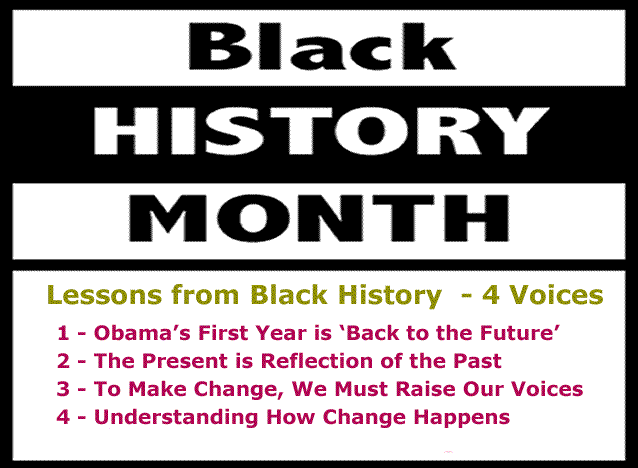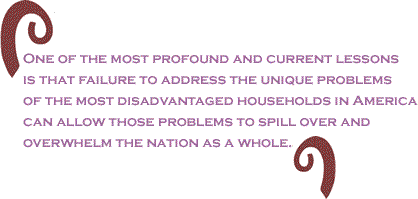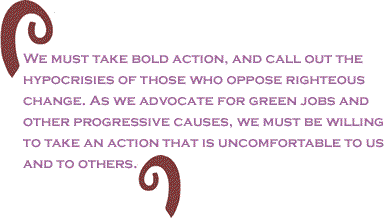
|
||||||||||||||||||||||
|
||||
Obama�s first year in office has been defined by very real concerns � getting and keeping jobs, providing the health care we need, improving education for our kids, keeping our country safe and finding solutions around immigration. But these real concerns, coupled with a Black president, have prompted prejudice � pure and simple. Americans have vacillated between our need for government programs that work and our resistance to them. Richie Drake, a disabled father with children on Medicaid, told a National Public Radio reporter that he opposed Congressional health care reform because Obama was only looking out for �the minorities.� On a recent plane trip, I listened to two men compare virtuous European immigrants of the mid-20th century to lazy and unpatriotic Latino immigrants. All the while, they denied � no, they believed�they had no racial bias. So what does Obama�s first year in office tell us? Ironically, race has emerged as an effective wedge, and has been made more effective by the weakly contested view that race no longer matters. A look at Black 19th and 20th Century struggles for full citizenship can help us understand why this was not a better year, and will help lead us toward what we can do now. Black history shows that a complex web of social, political and economic relationships impact the health of our democracy. Many factors fueled the Civil Rights Movement: Black social and political organizations, white patrons and college students, migration after the abolition of slavery, investment in infrastructure and other and New Deal-era social programs. Today, despite superficial similarities to past hard times, before, that complex web has changed. We have different structural conditions. Our economic crisis recalls the Great Depression, but Obama, unlike Roosevelt, is not from a wealthy, ruling-elite family raising taxes on his own class. Our wars in Iraq and Afghanistan remind us of Vietnam, but today�s wars reflect our fear of terrorism at home, not a far-off ideological threat. Central American immigration recollects the turn-of-the-century immigration of the Irish and of European Jews. But turn-of-the-century immigrants, deemed racially inferior at the time, still held more rights and a higher status even if they were considered �illegal.� In New York, the Irish could vote, even if they were in the country illegally. Today Black political and social structures are weaker than four decades ago. White patronage of Black causes is shrinking, too. According to a May 2009 study by the Community Service Society, in 1998 a mere 3% of foundation grant dollars went to African Americans. In 2006, that dropped to 1.5%. Obama is the canvas upon which we paint our hopes, or fears, or hate � depending upon who we are and what day it is. We can�t change that, but we can build and support institutions in communities of color, confront unconscious racism by calling it out, build alliances across race lines and produce policies that invest in people. This post originally appeared on New Deal 2.0. 2 - Lessons from Black History: The Present is Reflection of the Past
African-American history offers important lessons for America regarding the origins of the current economic crisis, how most effectively to climb our way out this mess, and how best to avoid a similar calamity in the future. In his first State of the Union address last month, President Barack Obama described the nascent economic recovery this way: �The worst of the storm has passed... but the devastation remains.� This astute description of the economy can also be applied to the effects of the aftermath of more than a century of discrimination. One of the most profound and current lessons is that failure to address the unique problems of the most disadvantaged households in America can allow those problems to spill over and overwhelm the nation as a whole. The current collapse of the housing and credit markets have their origin in unfair, reckless, and deceptive lending practices that disproportionately targeted communities of color for more than a decade before finally spreading beyond minority neighborhoods throughout the nation. Predatory lenders principally targeted communities of color because those neighborhoods had never recovered from � and therefore remained vulnerable as a result of � more than 100 years of legally permissible discrimination in employment, education, housing, financial services, and practically every other aspect of the economy and society. Failure to address the disproportionate damage to communities of color resulting from the current crisis will leave the US economy as a whole in a tenuous position as the nation moves further into the 21st Century. Within 35 years, more than half of the nation�s population will be people of color. Even before the current crisis, this fastest-growing segment of American society disproportionately lacked access to meaningful and secure employment, quality education, decent and affordable housing, dependable health care, reliable retirement savings, and other wealth-building opportunities. The disproportionate high levels of foreclosure in communities of color, combined with double digit unemployment rates for African American and Latino workers, may result in the greatest loss of wealth for those communities in nearly a century and will further economically marginalize those families and communities for years to come. Broad-based policies to rebuild our economy are essential. But universal policies that fail to address the complex challenges of historically disenfranchised communities are insufficient in themselves. Ensuring the civil rights of and providing opportunities for, people of color is critical to enabling minority families and communities to achieve their greatest potential. Sadly, neither universal policies nor targeted interventions have been forthcoming on a scale adequate to deal with increasing foreclosures, staggering unemployment, and a financial system badly in need of reform. And, the dire long-term implications for all Americans from this reality, appears lost on many in Washington.
This post originally appeared on New Deal 2.0.
There have been a few reminders lately that there are some advantages to being on the outside fighting the good fight, rather than being on the inside having won. Fifty-five years on, we cannot lose sight of the sense of rebellion embodied in a single person's choice of where to sit. Sitting in one seat, instead of another ten feet away, meant confronting a blind, irrational, rage that put Rosa Parks' life at risk in 1955. Her refusal to sit where she was expected to laid bare the lunacy and instability of a society so strictly ordered along racial lines. Her simple act of defiance shook the foundations of that society and quickened its demise. A simple personal decision became a revolutionary act of historic proportions. In the time since, we're grown used to a more comfortable life in the United States. African Americans are now tightly woven into the fabric of the nation. Even in Montgomery, even in Cicero, we've achieved the means, at least politically, to address our concerns from within the system - often, it seems, preferring negotiation to activism. Since January 20, 2009, we've seen the limits of that strategy. President Obama, who rode to victory in 2008 on an unparalleled wave of voter activism, saw that wave crest and dissipate. He was left to fight alone on issues that are nearly as baneful today as segregation was in our parents' time: climate change, and an unfair economy leaving millions without work and their children hungry and without medical care. Could it be that President Obama's supporters drew the wrong conclusions from his victory? Did they assume that with him in office these problems would be quickly addressed without strife, without a voice raised? Dr. Martin Luther King, Jr. warned us: "Human progress is neither automatic nor inevitable. Every step toward the goal of justice requires sacrifice, suffering, and struggle; the tireless exertions and passionate concern of dedicated individuals.� We must be those dedicated individuals. We must take bold action, and call out the hypocrisies of those who oppose righteous change. As we advocate for green jobs and other progressive causes, we must be willing to take an action that is uncomfortable to us and to others. We must responsibly call attention to injustice whenever and wherever we find it. We can�t be frightened by the words or actions of those fighting for their own interests and the status quo. Justice isn�t won with broad strokes or grand gestures. It is comes incrementally, by the tiny ripples of hope of which Robert Kennedy spoke � small actions that any of us can take in the daily fight for justice. The tiny ripples and simple acts of our parents, grandparents, aunts and uncles created a society much better than the one they inherited. It is incumbent on us to do the same � no matter how challenging or uncomfortable the task may be. This post originally appeared on New Deal 2.0.
During the 2008 Presidential election campaign, then-Senator and candidate Barack Obama was asked who Dr. Martin Luther King would have supported had he been alive.� Obama said that King would probably have supported no one but would have been pushing all the candidates on the movement�s issues. If there is one critical lesson from the last year, it is that in the absence of social movements -- and particularly social movements with dynamic and audacious leadership -- political change does not happen in a progressive direction irrespective of the intent of elected leaders.� This is a lesson that emerges from the history of the Black Freedom Movement and the challenges that it offered to both Democratic and Republican office holders. In the first year of the Obama administration, many of the President�s supporters have fallen prey to the notion that one great individual brings about change.� The level of magical thinking that exists among so many Obama supporters has led to paralysis when, in the face of opposition to his overly moderate policies from the political Right, the Obama administration has repeatedly blinked and not delivered sufficiently on the change that we have believed in. The Black Freedom Movement�s history demonstrated that irrespective of whether there is a �friend� in the White House, the movement itself must have its own independent program and agenda.� This agenda must be advanced in such a way that it puts heat on those in power even to the point of being excluded from the halls of power.� The Black Freedom Movement, or at least major sections of it, recognized that it does no good to be in the halls of power if all one is doing is collecting autographs. The second lesson we can draw from our history is that racism is hard-wired into U.S. capitalism and is not easily removed � certainly not simply or solely through the election of a person of color to even the highest of offices.� The immediate �post-racial� discourse following the election of President Obama collapsed in the face of the racist, irrational attacks that emerged from the political Right as it maneuvered to energize an anti-Obama and anti-progressive movement.� Using coded phrases and narratives �exemplified by the activities of the idiotic conspiracy theorists of the so-called �Birther Movement� (which challenges the legitimacy of President Obama�s claim to U.S. citizenship), or the Voodoo posters of President Obama that surfaced at anti-Obama rallies, or the rapid accumulation of guns and ammunition by whites in fear of the future, or the chant from largely white audiences that it was time to �reclaim America� �� the political Right has made race central to their organizing approach and message.
We cannot afford to ignore either of these lessons, both of which emerge from the history of the Black Freedom Movement.�� To put it another way, ignoring these lessons is done at our own peril, and the peril of this country�s future, which could, rather than be one of hope, end in a right-wing nightmare. This post originally appeared on New Deal 2.0. |
||||
 |
||||
If you would like to comment on this article, please do so below. There is a 400 character limit. You do not need a FaceBook account. Your comment will be posted here on BC instantly. Thanks. Entering your email address is not mandatory. You may also choose to enter only your first name and your location.
|
||||
Thank you very much for your readership. |
||||
| Any BlackCommentator.com article may be re-printed so long as it is re-printed in its entirety and full credit given to the author and www.BlackCommentator.com. If the re-print is on the Internet we additionally request a link back to the original piece on our Website. | ||||
| |
||||
Issue 364 |
| Executive Editor: Bill Fletcher, Jr. |
| Managing Editor: Nancy Littlefield |
| Publisher: Peter Gamble |
| Est. April 5, 2002 |
| Printer Friendly Version in resizeable plain text format |
 |
 |
 |

|
 |
| |
| |















































